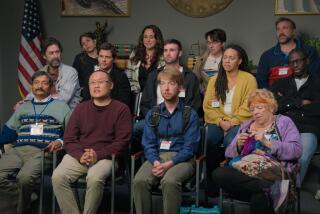What If the King Jury Again Is Mostly White? : Justice: We need diversity of attitude, not necessarily of color. Defendants are entitled only to juries free from prejudgment.
- Share via
Can an all-white jury render a fair verdict in the federal prosecution of four Los Angeles police officers accused of beating African-American motorist Rodney G. King? After viewing the pool of jurors who reported last week for jury selection, 80% white and only 10% African-American, the public is rightfully starting to ask questions. How can there be justice if the victim is not represented? How can there be justice if the African-American community is not represented?
The King case, like no case before it, has brought into focus the differences between how people believe our jury process should operate and how, in fact, it does. Many believe that for a jury to serve its function, it must mirror the diversity of the community affected by its verdict. There is, however, no constitutional requirement that a cross-section of the community be represented on an individual jury.
While juries are supposed to call upon a variety of life experiences in deciding cases, our laws have taken only minimal steps to ensure that all voices of the community will be heard in that process. Federal jurors are drawn from voters’ rolls only. Jury selection allows both sides broad discretion in excusing jurors. Until last year, defense lawyers could exclude jurors solely on the basis of race. There has never been an affirmative obligation for either side to select a jury that best represents all groups affected by the verdict.
Given these jury selection rules, it is quite possible that the jury selected for the federal King trial will be all white or have only token representation of the African-American community. How much legitimacy can the decision of such a jury carry? On a political front, the verdict is likely to be seen as inherently skewed. The legal perspective, however, is quite different.
We have intentionally tried to make the jury selection process racially blind. Right or wrong, our criminal justice system has adopted the philosophy that people, whatever their color, can represent community attitudes on some of the most important issues we face--including excessive police behavior. What is legally important is not the color of the juror’s skin, but whether the juror has prejudged the case.
The problem is, however, that we as people are neither as racially blind as we pretend to be nor are we eager to institutionalize racial quotas into our jury selection process. We are legitimately afraid of judging people by the color of their skin. Not only will such judgments be frequently wrong, but they can be easily used to discriminate against an entire group. On the other hand, it would be naive to believe that the color of one’s skin will never affect a person’s perspective on a case. A person who has suffered discrimination, or is close to someone who has, will bring a different perspective to a case where racial differences are at issue.
It would be better if the federal jury were racially diverse--better because there would be a greater diversity of experience and because the community would be more willing to accept the verdict. But just as it would be wrong to suggest that no African-American could be a fair juror for the case, it is incorrect to conclude that an all-white jury will, by definition, render an unfair verdict. There are whites in this community who are concerned about LAPD and its actions. There are whites who recognize that their neighbors, co-workers and friends of color have been treated differently.
If African-Americans are not selected to sit on this jury, there must at least be representation of their experience. The jury must reflect a diversity of attitudes toward police conduct.
The federal judge can help ensure that the jury’s verdict carries the moral force necessary to merit community acceptance. First, he can release those portions of the juror questionnaires, without names, that set forth the jurors’ attitudes and experiences. That way the public would know whether the jury selected represents a diversity of ideas. Second, he should not permit a juror to be excluded for cause solely because he or she does not automatically support the police. Defendants are not entitled to a jury of their peers; they are only entitled to a jury that has not prejudged the case.
It is possible to have a white jury that is as different from the Simi Valley jury as night is from day. The focus, however, must be on jurors’ attitudes. If we cannot have a spectrum of colors on the federal jury, let’s at least have a spectrum of ideas.
More to Read
Sign up for Essential California
The most important California stories and recommendations in your inbox every morning.
You may occasionally receive promotional content from the Los Angeles Times.













